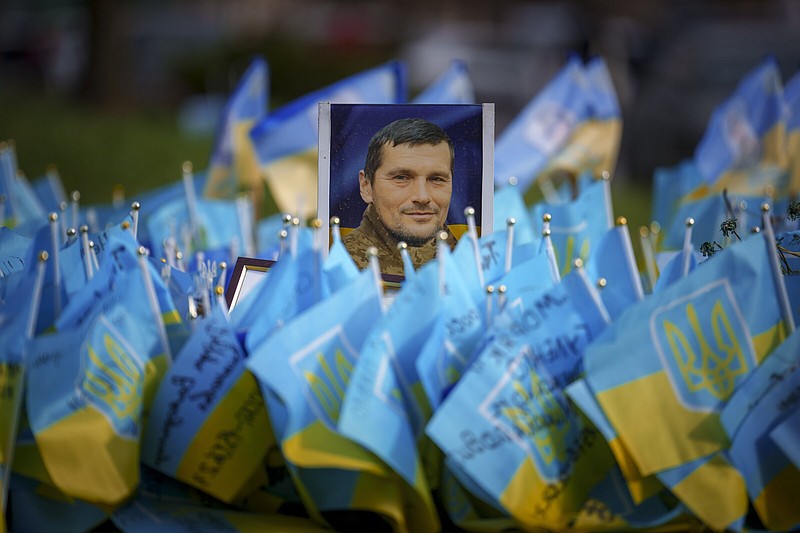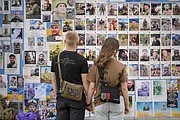KYIV, Ukraine -- Ukraine lowered its draft-eligible age for men from 27 to 25 on Wednesday, reflecting the strain that more than two years of war with Russia has put on its military and the need to infuse its depleted ranks with new conscripts.
President Volodymyr Zelenskyy signed three bills into law aimed at strengthening the country's beleaguered forces, which are trying to hold the front lines in fighting that has sapped Ukraine's ranks and stores of weapons and ammunition.
The new laws, which will also do away with some draft exemptions and create an online registry for recruits, might add around 50,000 troops to the military, said Oksana Zabolotna, an analyst with the Center for United Actions, a government watchdog in Kyiv.
That would be a tenth of the 500,000 additional troops that Zelenskyy said in December that the military wanted to mobilize. But after signing a security agreement with Finnish President Alexander Stubb in Kyiv on Wednesday, Zelenskyy said an audit requested by Ukraine's newly appointed commander-in-chief determined that the 500,000 figure was wrong, partly because existing troops could be sent from the rear to the front. He didn't say why that option wasn't considered previously.
Zelenskyy said he wasn't ready to say publicly how many new conscripts the Ukrainian army will need.
"I can say that Russia is preparing to mobilize an additional 300,000 military personnel on June 1," Zelenskyy told reporters.
Ukraine's parliament passed the legislation lowering the draft eligibility age last May, but Zelenskyy had delayed signing it in hopes that it would not be needed. As he relented and signed the measure, he signed other laws eliminating a category of medical exemption known as "partially eligible" and creating an electronic database of men in Ukraine, starting at age 17, to crack down on draft dodgers.
"It is a very unpopular decision, and that is why Zelenskyy held it without signing," said Volodymyr Ariev, a lawmaker in parliament who is in the opposition European Solidarity party. "Now he has no choice."
Ukrainian Defense Ministry statistics say the country's military had nearly 800,000 troops in October. That doesn't include National Guard or other units. In total, 1 million Ukrainians are in uniform, including about 300,000 who are serving on front lines.
In January, Ukraine's parliament withdrew a draft law on mobilization that included stiffened penalties for draft dodgers. That bill was reintroduced in February, but bogged down in parliament as lawmakers submitted more than 4,000 amendments. It would further expand the draft by closing loopholes for men obtaining a second college degree or in instances when several men in a family sought exemptions to care for a disabled relative. A vote is expected this month.
It is unclear how quickly Ukraine will draft and train the additional troops, or whether they will be ready before the expected Russian offensive. The comprehensive mobilization bill that has yet to pass in parliament envisions three months of training for soldiers drafted during wartime.
"The decision is taken -- it's a good one, but it's too late," said Serhiy Hrabsky, a colonel and a commentator on the war for the Ukrainian news media.
Zelenskyy has said he does not intend to conscript women into the military, although women with medical educations are required to register for the draft.
Ukraine's total population of 25- and 26-year-olds was about 467,000 in 2022, the latest year when the government published population estimates, according to Natalia Tilikina, the director of Institute of Youth, a research group. But many are already serving in the military, living in occupied areas or outside Ukraine, or have jobs or disabilities that exempt them from conscription.
Conscription has been a sensitive matter amid Ukraine's growing shortages of infantry and ammunition, which have helped give Russia the battlefield initiative. Russia's own problems with manpower and planning have so far prevented it from taking full advantage of its edge.
The average soldier's age on both sides is over 40, military analysts say. Some Ukrainians worry that lowering the minimum conscription age to 25 and taking more young adults out of the workforce could backfire by further harming the war-ravaged economy, which is why the draft age wasn't simply set at 18. But the problem has become more pressing because Kyiv is expecting a renewed push by Russian forces this spring or summer.
The Russian military said Wednesday that it has experienced a recent surge in enlistments, attributing it to public outrage over last month's attack on a Moscow concert hall that killed more than 140 people. About 16,000 people have signed up in the last 10 days, Russia's Defense Ministry said, though its claim couldn't be independently verified.
An affiliate of the Islamic State group claimed responsibility for the concert hall attack, but the Kremlin has insisted, without providing evidence, that Ukraine and the West played a role, despite their strong denials.
RELUCTANCE TO SIGN
Zelenskyy took almost a year to sign the law lowering the conscription age, perhaps reflecting how unpopular such a move might be.
Antonina Piliuhina, the 49-year-old Kyiv mother of a 21-year-old son, said she opposed lowering the draft age.
"I have just one son, I am a single mother," Piliuhina said. "What did I raise him for all these years, for him to be taken away and then killed by someone for fun? I don't need this."
Mykola Petrovskyi, a 28-year-old social worker, said that although he loves Ukraine, he doesn't think it's right to send people to fight if they're unwilling.
"I am not ready to go somewhere tomorrow and kill people," Petrovskyi said. "It's not because I'm not a patriot of my country, it's because I am not ready to kill. I am not born for this. I am a person who's ready to help save someone's life, but not take one."
But Metelya, a 37-year-old soldier who used his nom de guerre instead of his real name due to security concerns, said he was all for lowering the draft age. He said he's been fighting since 2014 -- the year Russia illegally annexed Crimea from Ukraine -- and new troops are needed.
"If an 18-year-old boy was ready to fight with us when we fought for Kyiv, then why can't a 25-year-old adult man do the same?" he asked.
Zabolotna, the government watchdog analyst, said even though there are about half-a-million men ages 25 to 27, she estimates only about 50,000 would be added to the ranks.
"Some of them are unfit for service, some have left, some are (in the) reserve or have the right to deferment," she said.
The law's introduction is a signal that Ukraine is facing up to the reality that it's in a war of attrition and of competition for resources, said Orysia Lutsevych, head of the Ukraine forum and deputy director of the Russia and Eurasia Program at the Chatham House think tank in London.
Zelenskyy was hoping for a relatively quick end to the war, she said. But he realizes that Putin "is not just fighting Ukraine. His main enemy is the United States and its presence in Eastern Europe."
The initial enthusiasm for going out to fight against the Kremlin's forces has waned, though public support for the war remains high.
At the outset of the war, the country drafted men ages 27-60, and the average age in the military is currently over 40. Under martial law, all men 18-60 had already been prohibited from leaving the country in case the decision was made to draft them. Men and women can volunteer for military service starting at 18.
Many Ukrainian men are evading the draft by hiding at home or trying to bribe their way out of the battle. Commanders say they don't have enough soldiers to launch offensives, and barely enough to hold positions during intensifying Russian assaults.
Russia's population is more than three times the size of Ukraine's, and President Vladimir Putin has shown a willingness to force men to the front if not enough volunteer.
Information for this article was contributed by Hanna Arhirova, Samya Kullab, Illia Novikov and Srdjan Nedeljkovic of The Associated Press and by Andrew E. Kramer of The New York Times.

